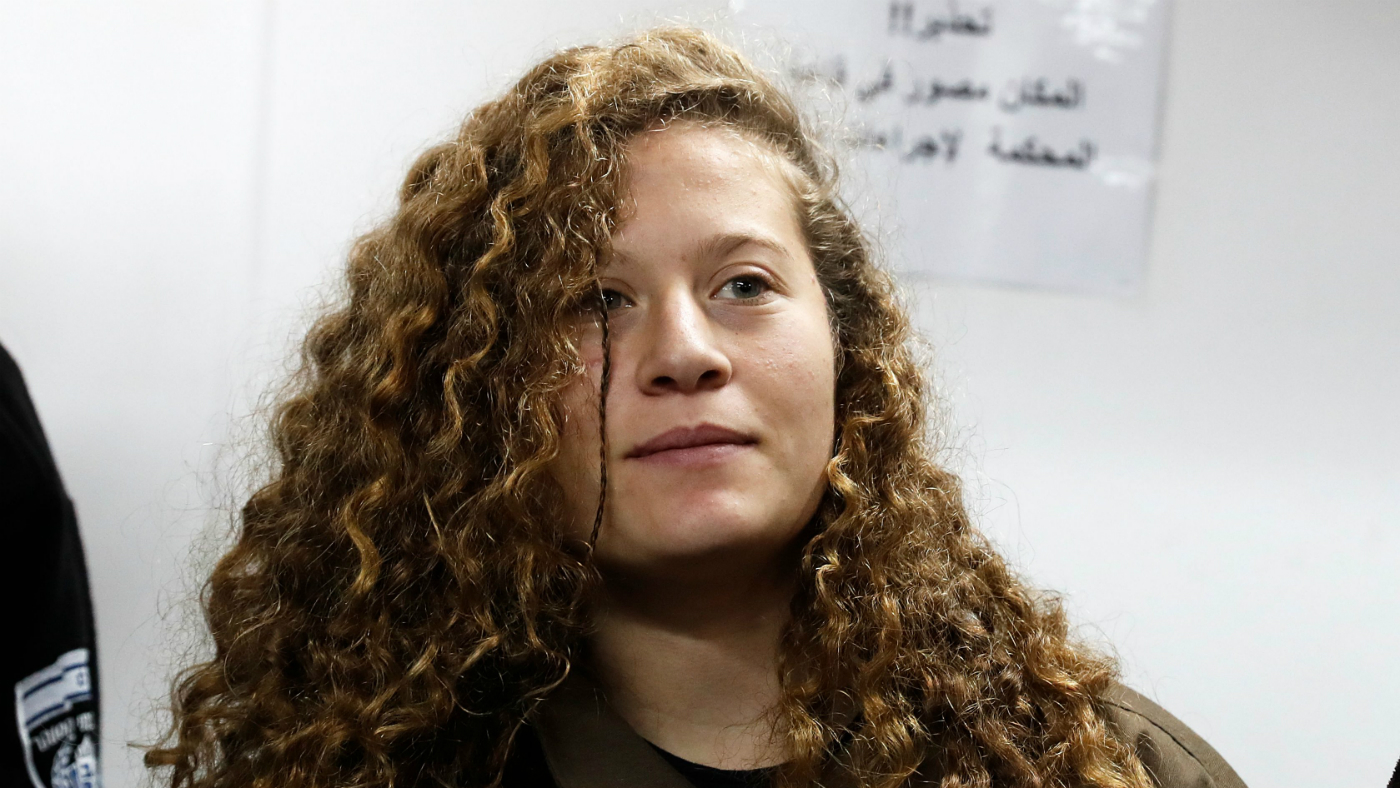Ahed Tamimi: Palestinian teen gets eight-month jail term
The 17-year-old activist was arrested after footage emerged of her slapping an Israeli soldier

A free daily email with the biggest news stories of the day – and the best features from TheWeek.com
You are now subscribed
Your newsletter sign-up was successful
Ahed Tamimi, the Palestinian teenager filmed slapping an Israeli soldier in the West Bank, has been sentenced to eight months in jail after accepting a plea deal.
As part of the agreement, the 17-year-old activist pled guilty to four of the 12 charges she faced, including assault and incitement. She is due to be released in July as she has already served four months in prison.
A video of her hitting and kicking an armed soldier in the occupied West Bank village of Nabi Saleh went viral in December after being live-streamed on Facebook by her mother.
The Week
Escape your echo chamber. Get the facts behind the news, plus analysis from multiple perspectives.

Sign up for The Week's Free Newsletters
From our morning news briefing to a weekly Good News Newsletter, get the best of The Week delivered directly to your inbox.
From our morning news briefing to a weekly Good News Newsletter, get the best of The Week delivered directly to your inbox.
The teenager was later arrested in a dawn raid. Denied bail, she was tried behind closed doors in a military court.
During her trial, Tamimi said she attacked the soldier after seeing Israeli troops shoot her 15-year-old cousin in the head with a rubber bullet.
Tamimi has since become “a cause célèbre” in the Middle East with protesters and human rights organisations demanding her release, the Times of Israel reports.
To Palestinians, she is a freedom fighter and a symbol of the resistance to occupation, but Israeli politicians, including culture minister Miri Regev, have denounced her as a terrorist.
A free daily email with the biggest news stories of the day – and the best features from TheWeek.com
“She is not a little girl, she is a terrorist,” Regev said. “It’s about time they understood that people like her have to be in jail and [should] not be allowed to incite racism and subversion against the state of Israel.”
Palestinians face an almost 100 percent conviction rate in Israel’s military courts, leaving them with little hope of a fair trial, Al Jazeera reports.
Plea bargains are “the norm” in Israel’s military justice system, which is “characterised by prolonged pretrial detention, abuse of kids and sham trials,” says Omar Shakir, Israel and Palestine director at Human Rights Watch.
“Hundreds of Palestinian children remain locked up with little attention on their cases,” he says.
-
 The 8 best TV shows of the 1960s
The 8 best TV shows of the 1960sThe standout shows of this decade take viewers from outer space to the Wild West
-
 Microdramas are booming
Microdramas are boomingUnder the radar Scroll to watch a whole movie
-
 The Olympic timekeepers keeping the Games on track
The Olympic timekeepers keeping the Games on trackUnder the Radar Swiss watchmaking giant Omega has been at the finish line of every Olympic Games for nearly 100 years
-
 Epstein files topple law CEO, roil UK government
Epstein files topple law CEO, roil UK governmentSpeed Read Peter Mandelson, Britain’s former ambassador to the US, is caught up in the scandal
-
 Iran and US prepare to meet after skirmishes
Iran and US prepare to meet after skirmishesSpeed Read The incident comes amid heightened tensions in the Middle East
-
 Israel retrieves final hostage’s body from Gaza
Israel retrieves final hostage’s body from GazaSpeed Read The 24-year-old police officer was killed during the initial Hamas attack
-
 China’s Xi targets top general in growing purge
China’s Xi targets top general in growing purgeSpeed Read Zhang Youxia is being investigated over ‘grave violations’ of the law
-
 Panama and Canada are negotiating over a crucial copper mine
Panama and Canada are negotiating over a crucial copper mineIn the Spotlight Panama is set to make a final decision on the mine this summer
-
 Why Greenland’s natural resources are nearly impossible to mine
Why Greenland’s natural resources are nearly impossible to mineThe Explainer The country’s natural landscape makes the task extremely difficult
-
 Iran cuts internet as protests escalate
Iran cuts internet as protests escalateSpeed Reada Government buildings across the country have been set on fire
-
 US nabs ‘shadow’ tanker claimed by Russia
US nabs ‘shadow’ tanker claimed by RussiaSpeed Read The ship was one of two vessels seized by the US military